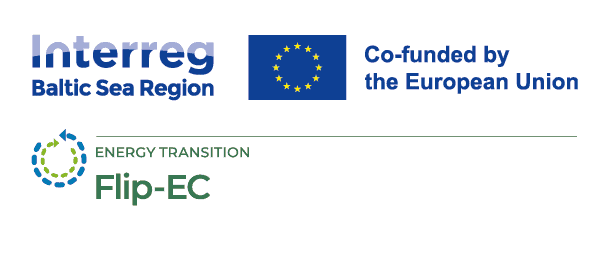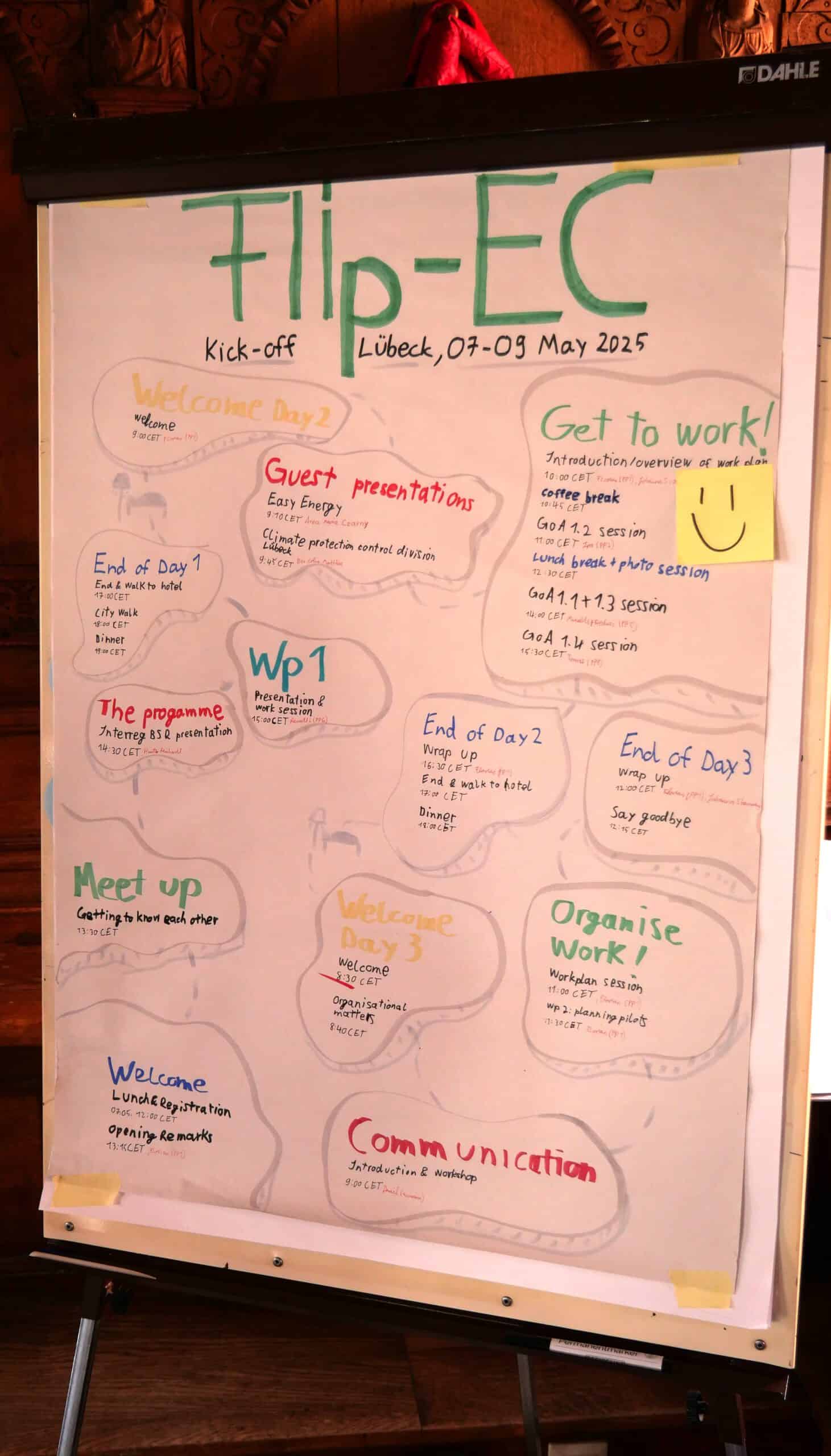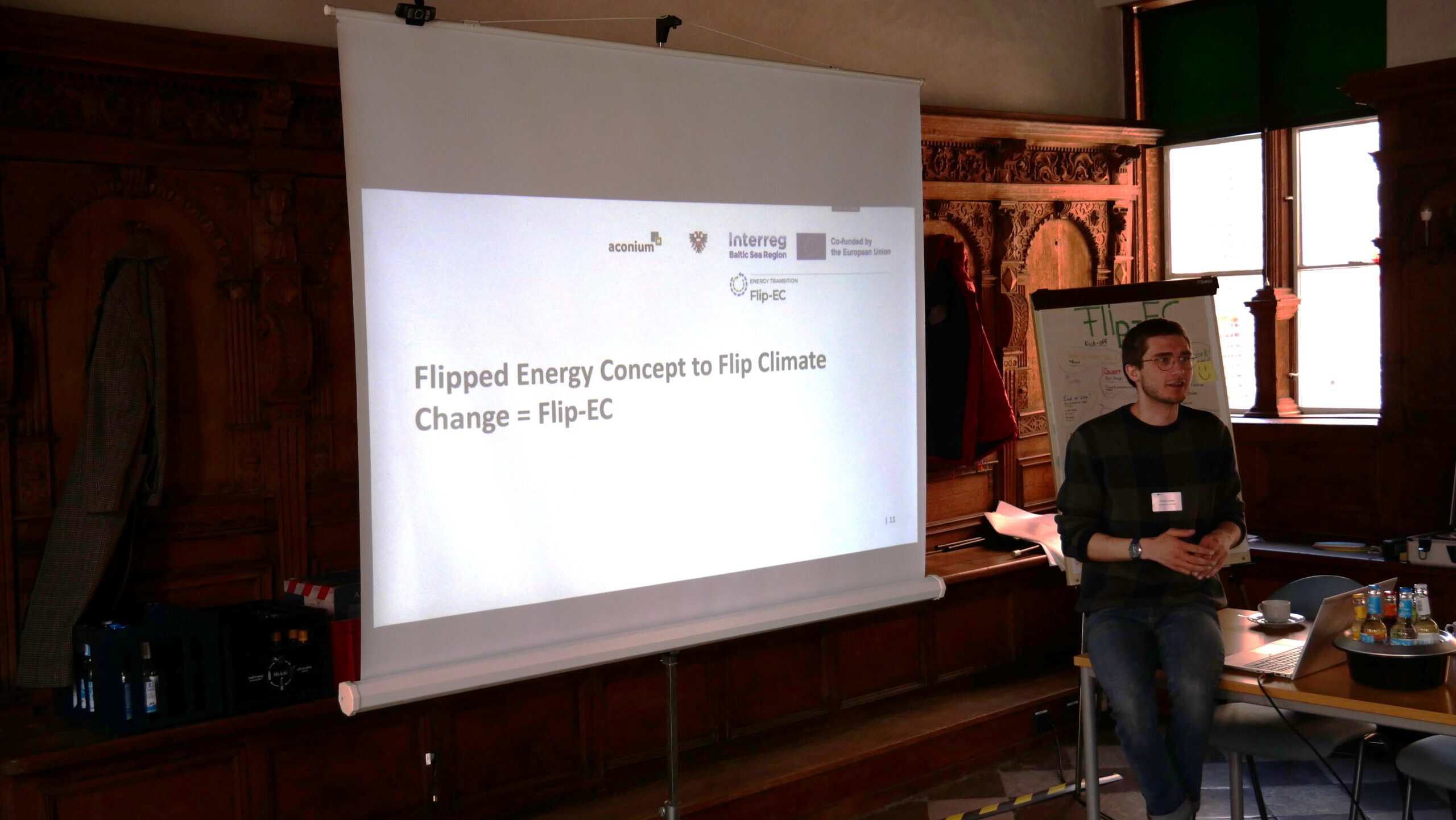
Flip-EC project officially launched in Lübeck to start a behavioural energy transition across the BSR
14 May 2025
The project „Flipped Energy Concept to Flip Climate Change” (Flip-EC) was officially launched in Lübeck, Germany, from 7th to 9th May 2025. The event marked a major step forward in addressing energy consumption in public buildings by focusing on behavioural change and user engagement across the Baltic Sea Region (BSR).
The three-day kick-off meeting, hosted by the Lead Partner, Hanseatic City of Lübeck, and supported by aconium GmbH, brought together a diverse group of partners from across the BSR. It kicked off a collaborative journey focusing on a powerful yet underused lever of the energy transition: the everyday decisions and habits of building users.
Empowering building users to lead the energy transition
Public buildings account for around 40% of total energy consumption and up to 36% of greenhouse gas emissions in the BSR and beyond. Yet, most energy transition efforts continue to focus on technological upgrades, while behavioural aspects remain overlooked. Flip-EC addresses this gap by empowering building users such as municipal employees, public building visitors (for example libraries), students, teachers, and citizens to adopt energy-conscious behaviours.
Co-funded by the Interreg Baltic Sea Region 2021–2027 Programme, Flip-EC follows a three-phase approach: solution preparation, piloting, and transfer. The project will develop participatory governance models, stakeholder engagement strategies, and frameworks for monitoring energy savings and social impact. The piloting phase will test these approaches in real-world settings. A digital learning platform and Train-the-Trainer programme will scale these efforts regionally.
Key highlights from the kick-off event in Lübeck
Over the course of the kick-off in Lübeck’s historic Town Hall, partners shared knowledge, explored the project’s objectives, and mapped out the collaborative work ahead. Highlights included:
- Guest contributions: Hunter Reinhardt (Interreg BSR) highlighted the objectives of the Interreg BSR 2021-2027 programme, while Anna Maria Czarny (EasyEnergy project) and Ben Colin Matthies (Lübeck Climate Protection Control Division) offered insights into parallel efforts and local climate strategies.
- Work package sessions: In-depth sessions were held for each Group of Activitiy (GoA) from Work Package 1 by the GoA leaders Eduversum, Social Innovation Centre (SIC) together with Smiltenes Municipality and Lithuanian Innovation Centre (LIC).
- City walk and networking: Participants enjoyed an informal city walk and group dinners, fostering connections that will support long-term cooperation.
- Project Steering Committee (PSC): The Project Steering Committee (PSC) had its inaugural session. It will oversee high-level project governance and coordination across all project partners.
- Communication workshop: The final day included a workshop on effective communication and visibility, led by aconium GmbH.
- Workplan preparation: Partners aligned on the planning of the first project activities, and discussed the timeline for the transition from preparation to hands-on implementation.
A diverse and committed consortium
The Flip-EC consortium includes 11 partners from 6 countries, bringing together municipalities, regional development agencies, research institutes, and education providers:
- Germany: Hanseatic City of Lübeck (Lead Partner) and Eduversum
- Latvia: Smiltenes Municipality, Social Innovation Centre (SIC) and Liepāja State Technical School (LSTS)
- Lithuania: Biržai District Municipality and Lithuanian Innovation Centre (LIC)
- Poland: Regional Development Agency in Bielsko-Biała (ARRSA) and Foundation Institute for Sustainable Development (ISD)
- Estonia: Development Centre of Võru County
- Denmark: Brøndby Municipality
Each partner brings distinct expertise, ensuring that project outputs are practical, scalable, and responsive to local needs.
What’s next?
Following a successful kick-off, the Flip-EC project now enters its first implementation phase, with a focus on Work Package 1. The following activities are planned until the end of the year:
- Surveys and focus groups with public administration and building users
- Research on monitoring tools for energy consumption
- Expert interviews with energy consultants
- Analysis of the collected data from surveys, focus groups and interviews
- Development of an overall communication strategy of the project
These steps will set the stage for the upcoming pilot phase, to ensure that Flip-EC’s behavioural energy-saving strategies are based on solid evidence.









